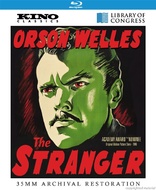The Stranger Blu-ray Movie
HomeThe Stranger Blu-ray Movie 
Kino Lorber | 1946 | 95 min | Not rated | Oct 15, 2013Movie rating
7.4 | / 10 |
Blu-ray rating
| Users | 4.5 | |
| Reviewer | 4.0 | |
| Overall | 4.0 |
Overview
The Stranger (1946)
Charles Rankin, a respected academic at a prominent Connecticut college seems to have the perfect life: a beautiful new wife; and a charming home in a small town that holds him in high esteem. Enter Mr. Wilson, a detective on the hunt for Nazi war criminal Franz Kindler. The appearance of Mr. Wilson threatens to reveal that underneath this idyllic veneer is a secret that could tear everything apart.
Starring: Edward G. Robinson, Loretta Young, Orson Welles, Philip Merivale, Richard LongDirector: Orson Welles
| Film-Noir | Uncertain |
| Drama | Uncertain |
| Crime | Uncertain |
| Mystery | Uncertain |
Specifications
Video
Video codec: MPEG-4 AVC
Video resolution: 1080p
Aspect ratio: 1.37:1
Original aspect ratio: 1.37:1
Audio
English: LPCM 2.0 Mono (48kHz, 24-bit)
Subtitles
None
Discs
50GB Blu-ray Disc
Single disc (1 BD)
Playback
Region free
Review
Rating summary
| Movie | 4.0 | |
| Video | 3.5 | |
| Audio | 4.0 | |
| Extras | 3.5 | |
| Overall | 4.0 |
The Stranger Blu-ray Movie Review
Welles on Fascism
Reviewed by Casey Broadwater October 15, 2013After the critical success but box office bombing of Citizen Kane and The Magnificent Ambersons—which would eventually come to be regarded as two of the best American films of all time—writer, director, actor, and all-around auteur Orson Welles was out to prove that he could find commercial success without entirely sacrificing his artistic vision. His next feature, 1946's The Stranger, is widely regarded as his most straightforward film, and while it may not have the scope of Ambersons or the influential narrative style and visual trickery of Kane, it is a smart and incisive take on what would've been, in lesser hands, a routine thriller. (A modern Welles analogue might be Steven Soderbergh, a true auteur—with a "direct one for them, then one for me" attitude—who brings his distinct sensibility even to slick dross like the Oceans series.) Like Kubrick doing horror with The Shining or Tarkovsky using sci-fi to explore the psychology of grief in Solaris, The Stranger is Welles hijacking a genre—in this case, the noir-tinged post-war thriller—as a vehicle for his own political/philosophical interests.

In particular, after the recent defeat of Nazi Germany, Welles was concerned about the insidious nature and possible resurgence of fascism. Welles himself plays Nazi war crimes fugitive Franz Kindler, a Heinrich Himmler type who helped orchestrate the Final Solution, fled Germany after destroying all evidence of his identity and involvement, and has started a new life as a history professor at an all-boys prep school in Harper, Connecticut. Going by the assumed name of Charles Rankin—and putting on a perfect American accent—he quickly becomes an esteemed pillar of the community, to the extent that he's engaged to wed Mary (Loretta Young), the daughter of the town's political big-shot, Judge Longstreet (Philip Merivale), a Supreme Court justice.
Rankin is playing a long-con here, bidding his time "until the day when we strike again," and he believes he's safely out of sight in this sleepy northeastern hamlet. His disguise is threatened, however, on his wedding day, when his former underling—a diminutive, religion-obsessed Nazi named Meinike (Konstantin Shayne)—arrives in Harper, looking for him. The Allied War Crimes Commission has recently freed Meinike, hoping he'll lead them to the infamous Franz Kindler, and that's exactly what he unwittingly does. Hot on Meinike's trail, of course, is Mr. Wilson (Edward G. Robinson), a "kind of detective" intent on exposing "Rankin" and bringing him to justice.
With the gears of the story in place, Welles lets The Stranger play out like precision, Swiss-grade clockwork. There's the tension between the psychologically manipulative Rankin and his wife, who becomes increasingly disturbed by her husband's behavior. There's Mr. Wilson's steadfast gathering of intel. There's the winding tension of waiting for Rankin to explode or otherwise expose his true self. He comes close in the film's thematic centerpiece, a dinner with the Longstreet family—with Mr. Wilson in attendance—where Rankin delivers an impassioned argument on the mindset of the German people, invoking Wagner and Teutonic legend and explaining that "the German sees himself as the innocent victim of world envy and hatred, conspired against, set upon by inferior peoples, inferior nations. He cannot admit to error, much less to wrongdoing."
It's a monologue that's reminiscent of Welles' Ferris wheel speech in Carol Reed's The Third Man in that it cements and defines the film's ideological center. Welles saw German fascism as an insidious force that would not easily be stamped out through a simple military defeat. It was imperative, in his view, to show the German people what fascism had wrought, and this is manifested in a scene where Mr. Wilson makes Mary Longstreet watch a film reel of the gas chambers and crematoriums that her husband had created. (This was, in fact, a real-life film reel produced by Billy Wilder and intended to be shown throughout Germany.) For reform, and in order to "never forget," we have to stare directly into the horrors of extreme nationalism.
Though not as grand a statement, the The Stranger is every bit as stylistically Wellesian as Citizen Kane. The deep focus, the chiaroscuro lighting and silhouettes, the elaborate tracking and crane shots—it's all here, evidence of a director who knew exactly what he wanted on screen. (Even if this was later botched by studio interference, as the editing of The Stranger occasionally reveals.) Most notable here is Welles' uses of verticality to illustrate the hierarchy of authority and power. He frames some characters from above and others from below, and there are numerous "level" references, like Mr. Wilson mentioning the "lowest depths of hell," Herr Meinike referring to God as "The Highest," and Rankin describing the defeated Germans' "subterranean meeting places." The film culminates in a showdown inside the town's clock tower, which Rankin has been restoring in his spare time, and the ending—without giving anything away—is the direct opposite of a deus ex machina. Instead of delivering unexpected salvation, this machine of the gods—the clock tower—doles out retribution from on high and brings Franz Kindler low indeed.
The Stranger Blu-ray Movie, Video Quality 
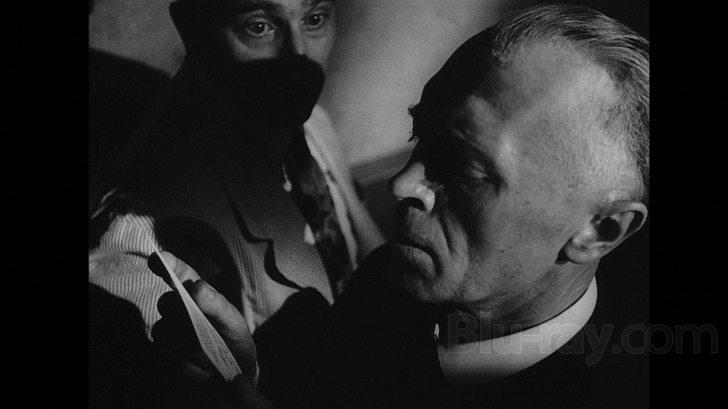
As a film in the public domain, The Stranger has been subjected to far too many badly handled home video releases by distributors hoping to
make a quick buck. (See also: the many, many shoddy DVD versions of Night of the Living Dead.) This isn't even the movie's first appearance on
Blu-ray. Film Chest put out a high definition edition in 2011,
one that garnered mixed-to-negative reactions. On one hand, the print had been given a
thorough digital cleanup, minimizing specks and scratches, but on the other, the process also involved contrast boosting and heavy DNR filtering that left
the image grainless and robbed of its inherent texture. Kino-Lorber's 1080p/AVC-encoded transfer is much better, simply by taking the opposite
approach.
Using a 35mm print preserved by the Library of Congress, the folks at Kino—as they often do—have essentially left the print "as-is." This means that you
will see bouts of specks and vertical scratches throughout the film—along with a few missing frames—but you'll also see normal 35mm grain patterns,
untouched by noise reduction. The result is an image that shows some of the wear and tear of its source material, but definitely looks more filmic and
natural. Consequently, the level of clarity is also much higher here, with strong detail in faces and the fabrics of the characters' dresses and herringbone
suits. The black and white photography is better balanced as well; contrast is a bit lower and, on the whole, the picture looks—for the lack of a better
phrase—less tampered with. It's definitely an improvement. Could it be better? Sure. It's easy to imagine a hypothetical edition where the print damage is
removed and the grain structure is preserved—let's call this the Criterion treatment—but this is probably the best The Stranger will look
for some time to come.
The Stranger Blu-ray Movie, Audio Quality 
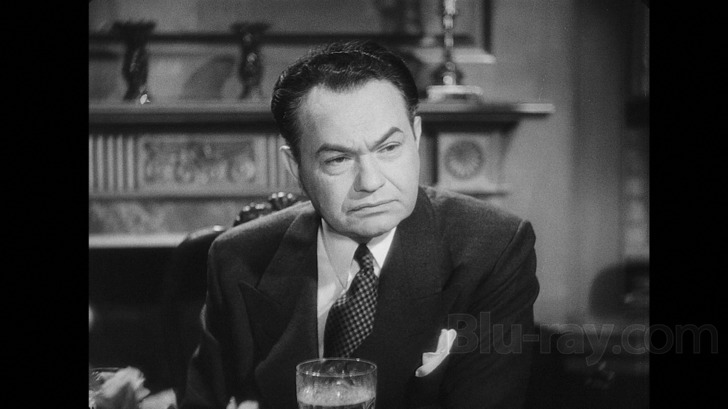
The Film Chest version of The Stranger had a lossy audio track, but Kino-Lorber rectifies that with an uncompressed Linear PCM 2.0 mono mix. As with the video transfer, there are still some age-related quirks here—mostly crackling and occasional low-level hisses—but nothing that could even remotely be described as a distraction. Dialogue is always clear and easily understood, and Bronislaw Kaper's tense score has a wonderful presence and clarity, with only mild high-end brashness at times. The only oversight here is that Kino-Lorber has once again not bothered including any subtitle options for those who might need or want them.
The Stranger Blu-ray Movie, Special Features and Extras 
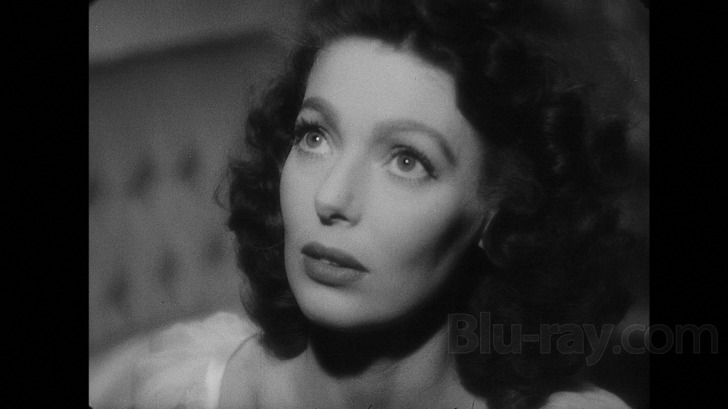
In the extras department too, Kino's release handily outdoes the Film Chest edition, featuring an expert commentary track, a short documentary on the Nazi death camps, and an hour and a half of vintage Orson Welles radio broadcasts.
- Audio Commentary: Filmmaker, film historian, and Kino-Lorber Blu-ray producer Bret Wood breaks down the thematic and visual complexities of Welles' seemingly simple thriller.
- Death Mills (SD, 21:30): Billy Wilder produced this 1945 informational film on the Nazi death camps—footage of which appears in The Stranger—that was intended to be shown to the German people to reveal the murder and torture behind the Nazi regime's pageantry and parades.
- Welles' Wartime Radio Broadcasts: The disc includes four WWII-era broadcasts that Welles voiced. "Alameda" (28:52) is the dramatization of a hypothetical Nazi takeover of a small Canadian town, "Brazil" (28:52) is the first episode of a variety program meant to introduce Americans to the rest of the Americas, "War Workers" (14:33) is a War of the Worlds-type pseudo-documentary about a German spy inside a Lockheed-Vega aircraft plant, and "Bikini Atomic Test" (14:38) is an opinion piece about the U.S.'s post-war continuation of atomic tests. A great inclusion.
- Trailers (HD): Includes trailers for The Stranger, White Zombie, and Night Tide.
- Gallery (HD): A user-directed gallery with sixteen stills, posters, promo images, and storyboards.
The Stranger Blu-ray Movie, Overall Score and Recommendation 
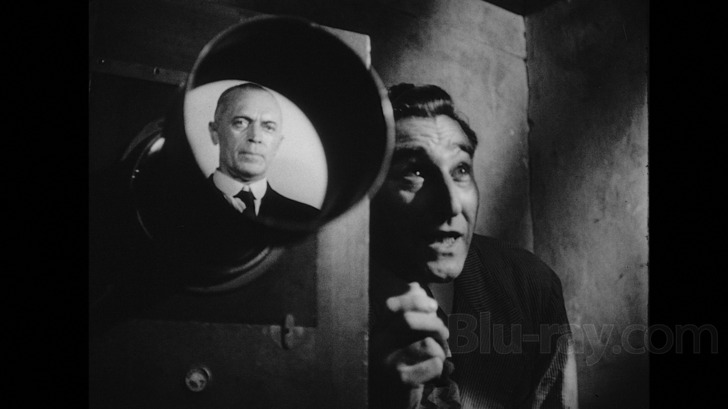
Though not as celebrated as Orson Welles' two previous films, The Stranger is a crucial part of the director's filmography, proving he could create a commercial success without (fully) sacrificing his artistic integrity. It's a slick, thematically substantial post-war thriller, and it holds up well next to some of the best noir films of its day. The Stranger has had a checkered history on home video—like many films in the public domain—but Kino-Lorber has treated the movie with respect, giving us a detailed high definition transfer, a lossless audio track, and a disc that includes an informative audio commentary and a series of vintage radio broadcasts. It's a definite upgrade from 2011's Film Chest release, which was DNR'd to death and only featured lossy audio. Recommended!
Similar titles
Similar titles you might also like

Jack Irish: Season 2
2018

This Gun for Hire
1942

The Blue Dahlia
1946

The Woman in the Window
1944

On Dangerous Ground
Warner Archive Collection
1951

Boomerang
1947

Appointment with Danger
1951

Trapped
Deluxe Edition
1949

I Wake Up Screaming
Hot Spot
1941

The Man Who Watched Trains Go By
The Paris Express
1952

Shield for Murder
1954

The Captive City
1952

Impact
Collector's Edition
1949

Abandoned
1949

Motherless Brooklyn
2019

Pitfall
1948

Phantom Lady
1944

Crime of Passion
1957

All My Sons
1948

Black Widow
Limited Edition to 3000
1987
